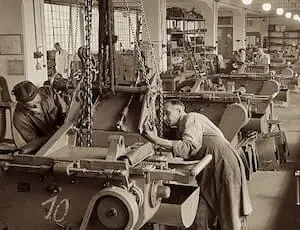‘Cloth ears’ is a rebuke directed at a person who fails to hear something that is said to them. The expression is usually delivered with disparaging or humorous tone – “Oi, cloth ears, can’t you hear me?”
Cloth ears
What's the meaning of the phrase 'Cloth ears'?
What's the origin of the phrase 'Cloth ears'?
The term ‘cloth ears’ originated in the weaving mills of northern England in the early part of the 20th century.
When the spinning and weaving of wool and cotton became industrialised during the Industrial Revolution the trade was centred on the counties of Lancashire and Yorkshire. Many of the large mills that were built in the 1800s are still standing and some are complete with long rows of machinery, preserved as museums.
The noise in a spinning and weaving mill was tremendous. As one former cloth mill worker explained:
“You was overwhelmed at the roar of noise, and for about three days all you could hear was the roar in your ears. But after that you became part and parcel of it and you could talk quite normally. Although you didn’t realise it, you were doing a lot of lip reading.”
The name given to the deafness that mill workers were commonly afflicted with was ‘cloth ears’. The equivalent condition that workers in nearby steel mills developed was ‘boilermaker’s deafness’, which is still the medical name for noise induced deafness.
Workers must have been subject to ‘cloth ears’ since the factories were built, but the first record of the phrase in print is from the start of the 20th century, in Compton Mackenzie’s 1912 novel Carnival:
“I wish you’d listen. Have you got cloth ears?”
Mackenzie’s story is set in London, so ‘cloth ears’ must have migrated south by 1912 and it is reasonable to assume that it was in colloquial use in the north of England prior to that date. So far, I haven’t been able to find an earlier citation of it.
The expression hasn’t travelled far outside of England, although John Cleese did bring it to worldwide notice when he used it in Fawlty Towers to describe the character Polly (played by his co-writer and then wife, Connie Booth) as a “cloth-eared bint”.
The history of “Cloth ears” in printed materials
Trend of cloth ears in printed material over time
Related phrases and meanings
Browse more Phrases
About the Author

Phrases & Meanings
A-Z
A B C D E F G H I J K L M N O P Q R S T UV W XYZ
Categories
American Animals Australian Bible Body Colour Conflict Death Devil Dogs Emotions Euphemism Family Fashion Food French Horses ‘Jack’ Luck Money Military Music Names Nature Nautical Numbers Politics Religion Shakespeare Stupidity Entertainment Weather Women Work
How did we do?
Have you spotted something that needs updated on this page? We review all feedback we receive to ensure that we provide the most accurate and up to date information on phrases.
